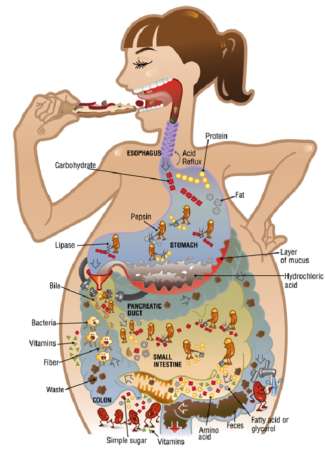
Gut health is so important and yet so frustrating, especially when everything is not moving properly.
Traveling on the Gastrointestinal Highway
Imagine seeing the digestive system from the food’s perspective; what a fantastic voyage that would be! It can be argued that the digestive system is the predominant system to predict one’s health. Think about all that the gastrointestinal (GI) tract is responsible for, including digestion, absorption, and excretion of food, detoxification, synthesis of vitamins and neurotransmitter production (brain/gut connection). Healthy guts secrete appropriate levels of digestive enzymes, protect the stomach lining, kill the ‘bugs’ before they can get in, and effectively eliminate waste. This complex digestion happens in three parts; the mouth, the stomach and the small intestines. When all is going ‘smoothly’ the act of digestion goes unnoticed. But if one of those parts malfunction it can be devastating and begin an individual’s quest to search for answers.
What can cause a decline in gut function? Medications (like antibiotics, NSAIDS), toxic exposures (to things like metals or pesticides), allergies, autoimmune disease, genetic influences, candida, parasites, nutrient deficiencies or stress are the usual suspects. Signs that gut function can be declining could include weak and cracking fingernails, acne, bacteria or yeast infections, fatigue, chronic urinary tract infections, iron deficiency, or undigested foods found in the stool. Common GI disorders include Crohn’s disease, colitis, constipation, irritable bowel, GERD, and gastroparesis (delay in stomach emptying) which all have a negative effect on the quality of life.
The biggest complaints of a malfunctioning gut include bloating, belching, flatulence after eating, heartburn, a sense of fullness after a few bites, IBS, nausea or diarrhea. Many different factors should be considered for gut function decline, such as hypoglycemia, food allergies, and intolerance to sugars (i.e., lactose, fructose, or sorbitol.) Irritable bowel syndrome or IBS is a common diagnosis for a range of complaints. Symptoms include abdominal pain, cramping, bloating, gas, mucus in the stool and altered bowel habits (constipation/diarrhea.) Treatment often includes increasing fiber, reducing stress and various medications (antispasmodics or laxatives), but food intolerances or allergies are often overlooked. Foods frequently implicated in allergies or intolerances include wheat, dairy, corn, eggs, onions, chocolate, coffee, tea, nuts, citrus, rye, potatoes, barley, and oats. Once the offending food is identified and removed from the diet symptoms often lessen or disappear altogether.
GastroEsophageal Reflux Disorder (GERD) is characterized by the reflux of stomach contents into the esophagus. GERD can be triggered by smoking, obesity, ingestion of certain foods or beverages, eating too quickly or too much at one time. To lessen symptoms of GERD, eat small frequent meals, chew your food well and avoid excessive fat. Eating less before bed and avoiding foods that trigger such as caffeine, citrus, tomatoes, onions, mints, and alcohol may also help those suffering from GERD. Overproduction of stomach acid is generally considered the cause of stomach reflux, but an underproduction of stomach acid can also be blamed. Individuals with hypochlorhydria (the underproduction of adequate stomach acid) may experience feeling unusually full after small meals, belching, flatulence, morning diarrhea, constipation, heartburn, and a sensation of food getting ‘stuck.’ Ingesting ½ tsp of apple cider vinegar mixed with water that doesn’t produce a slight burning sensation may indicate a low or weakened stomach acid.
Constipation is a common complaint among those suffering from digestive problems. Infrequent bowel movements (less than three a week), hard stool, and the feeling of incomplete emptying are common among those suffering from constipation. Causes can include mechanical/structural, endocrine disorders, certain medications, and possibly inadequate intake of fluid or fiber. Generally, constipation is treated with increase fiber and fluids, more exercise, and possibly medications like stool softeners or laxatives. (It should be noted studies have shown those who suffer from slow transit disorders do not get relief when increasing fiber.) Fiber filled food like flaxseed has been shown to increase the frequency of bowel movements in both the oil or seed form. Prunes and prune juice have proven to help relieve or treat constipation mainly attributed to the high sorbitol content. Supplements like probiotics also have been an effective treatment for constipation when the correct probiotic strain is used. Vitamin C has provided some relief mainly for its osmotic laxative qualities. And for some suffering with low B12, they found constipation relief as a happy coincidence when receiving a series of B12 injections. Untreated hypothyroidism commonly causes constipation and symptoms are alleviated when the thyroid hormones are corrected. Perhaps surprisingly, food allergies should also be considered as a cause of constipation. For example, dairy is a common cause of constipation in most children. Some studies have shown when dairy is removed from the diet 70% of constipation had disappeared. Food sensitivities in any age can decrease intestinal motility and slow down the intestinal transit, causing constipation when an offending food is consumed.
Happily, relief is out there. Gut health is so important and yet so frustrating, especially when everything is not moving properly. For many individuals suffering from the noted symptoms, it is so nice to know you aren’t alone. Seek help from a health care professional and get some relief!
Sponsored Links
About the Author

Rachel Ezelius, RD
Rachel Ezelius is a Registered Dietitian who manages Fitness Incentive’s Eat Smart program. Questions? Contact her
by email: eatsmart@fitnessincentive.com. Click here to learn more about Eat Smart



